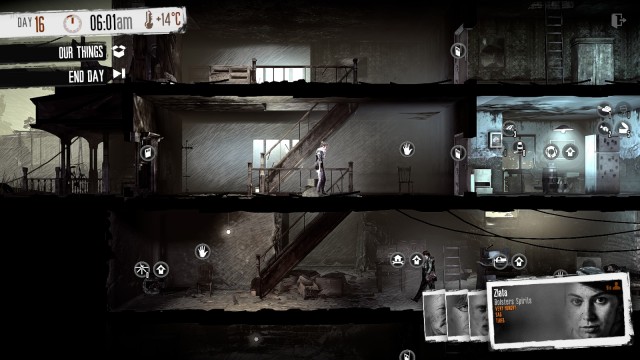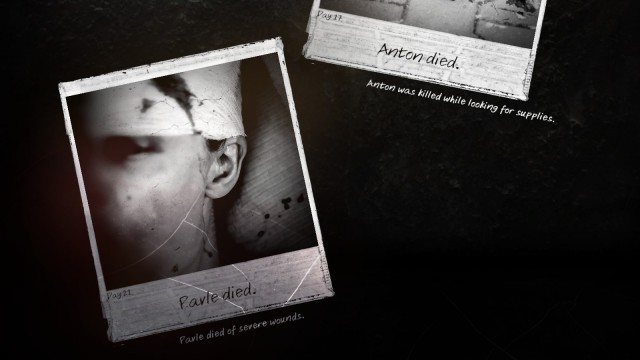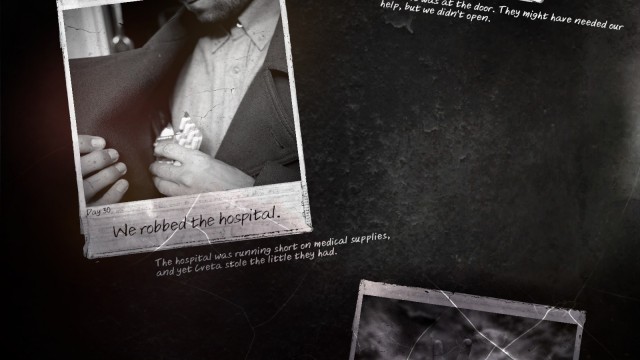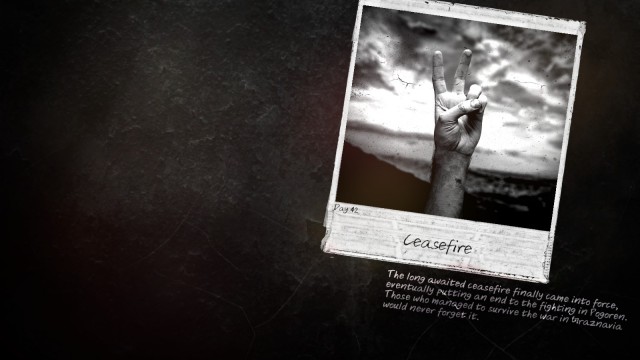There were four of them in the house. Anton, was the oldest. In his previous life before the war he was a respected mathematician and a professor. When he joined the group, he was so sick could barely stand up. They made a bed for him in the basement, and took turns watching over him and bringing him food. Zlata was an aspiring musician. She was young enough to have been one of his students back when schools were still opened. She would often sit by his bedside and play the guitar to cheer him up. Cveta was closer to Anton’s age. She used to be a school principal, and the war hit her especially hard. Out of the entire group she had the hardest time adjusting to the new reality. Pavle, an accomplished athlete and former football star did not have such problems. He learned to use his skills to scavenge and avoid trouble, and could throw a mean punch when cornered. He soon became the groups main provider.
They worked out a pretty good system: Pavle would go out at night and scavenge for food and supplies. Cveta and Zlata would stay home and guard the groups possessions. When Anton got better, he joined the guard rotation so that the others could get more sleep. He was not much of a scavenger, and he could not carry much loot anyway. Neither could Cveta for that matter. Zlata however was young and agile, and eager to help out. She and Pavle worked out a rotation. Each night one would go out to scavenge and the other one would sleep or stand guard.
On one of her runs Zlata stabbed a soldier in the back.
She found him at an abandoned supermarket. He cornered a young girl and was making threats and demands waving his weapon around. It was a split second decision, but she did not regret it. The girl run off, but later a woman from the neighborhood told them she got home safe. Who knows what would happened to her if Zlata did not bring a knife that fateful night. Zlata, the golden* girl. Zlata the hero, they called her. Anton tried to play the guitar that night, but he was terrible at it. Zlata brought the soldier’s assault rifle and a box of ammo home. The group now had means to defend themselves from raiders.
Pavle found an abandoned villa with lots of supplies. Unfortunately it turned out it was not really abandoned. Few military deserters made a nest in the basement. On the second floor Pavle found a pile of human corpses, all carved up, charred or otherwise broken… Their wounds were not a result of a fight. These people have been tortured and murdered with exceptional malice. There was a locked room at the end of the hallway, and when Pavle tried to force the door open a man cried out for help from the inside. Pavle did not bring a crowbar or lock picks so he was unable to open it. He made too much noise and alerted the deserted. They were heavily armed. Pavle got shot, but somehow managed to get back home.
His woulds looked grave and the group did not have any bandages. Without some sort of medical aid, Pavle was as good as dead.
All the nearby buildings they could easily get to were already picked clean. The spots that could potentially have some left over medical supplies were off limits due to heavy military activity. However, Zlata knew that the deserters would likely have some military supplies. Chances were that at least some of them would carry standard issue med-packs with bandages and pain killers. She also felt bad for their hostage. She could not sit idly while a man was trapped out there with deranged killers. She hatched a plan.
Next night she went to the villa armed with a knife and a set of lock picks.
When she came back in the morning her eyes were hard and fierce.
She brought food, booze, three rifles and lots of ammo, but no meds or bandages. The hostage was safe, she told the group. The deserters would no longer be a problem. The villa was abandoned again. Pavle got worse. His wounds kept opening up and they could not stop the bleeding.
There was a military outpost near by that was very well stocked. They were bound to have medical supplies, and they were known to trade with the locals. Cveta gathered the little surplus possessions they had left and went there to trade for bandages. They told her to leave. Few days earlier Pavle visited the outpost and was caught trespassing and trying to steal their supplies. The soldiers were still very sore about that, and refused to trade. They would not listen to Cveta’s pleading. “Serves him right”, they said.
Pavle got worse. He could no longer get up on his own. His wounds were infected and he was running a fever. They had to take turns bringing him food. None of them had medical training, but it was clear he might not make it without some medical help. Zlata refused to sit idly and watch her friend die. She took off to the military outpost, her trusty knife in her pocket. It had four notches on the handle already. She would add a few more if that’s what it took to save Pavle. That said, she hoped that she won’t have to use it, and that stealth and subterfuge will be enough to steal some medical supplies.
Anton pleaded with her, and warned her not to go, but deep down inside he believed she could make it. Zlata was, after all, the golden girl. God watched over her. She was magical. If anyone could break into a military outpost and come back with supplies, it was her.
She did not make it.
Turns our that a musical prodigy armed with a kitchen knife was no match against four trained killers with automatic weapons.
Anton was devastated. Next night he picked out the best of the four rifles the group had in the house, and put a few clips of ammo in his backpack. He was not a vengeful man, he assured Cveta, and it was not about vengeance. Zlata deserved a proper burial, and Pavle would not make it much longer without medical supplies. If they don’t do anything and let him bleed out, then the golden girl died for nothing. He was lying, of course. But only about that first part. It was about vengeance. Never in his life did he wish death upon another human being. Not until now. He wanted these soldiers dead.
He arrived at the outpost at dusk and got inside the building. He set himself up in a long hallway with a clear escape route behind him. The soldiers would have to climb up the stairs on the opposite side, and he would mow them down as they came in. If he ran out of ammo, he could just take a step back and jump off the balcony and run to safety.
Anton fired a shot into the air to alert the soldiers.
When the first head cleared the stairway he pulled the trigger. The rifle kicked back harder than he expected it to. His shots veered wildly off the target. The return fire was swift and accurate. Single burst of fire echoed in the hallway with a resonant “ra-ta-ta-ta-tat”. Anton’s skull burst into tiny pieces, his cranial fluids staining the walls behind him.
Pavle bleed out to death that night.
Temperature dropped, and it started snowing outside. Cveta chopped up Pavle’s old bed for firewood. She had no use for it anymore. At least the blood stained oak and plywood would keep her warm. She kept herself busy, trying not to think about the events of the last few nights. She wanted to weep for her fallen friends, but she could not find the tears. She wanted to scream in an impotent rage, but she just did not see the point. True depression, as she was learning, was not sadness or despair. It was an overwhelming emptiness and a sense of existential enui. But she tried to fight it as best she could. She had to survive for Anton, for Pavle and of course for Zlata.
She sold Zlata’s guitar for some canned food and vegetables. She never learned to play it, and she could not stand seeing it around the house.
She repaired an old radio and tried listening to the few remaining music stations that were still broadcasting. There was never anything good on it. Only bad news, and some sad sounding, old music records playing on a loop throughout the day.
When there were four of them in he house, they were always hungry. There was simply not enough food for all of them. Cveta would often skip a meal or two to make sure Pavle and Zlata were well fed. Now she had more food than she knew what to do with. She figured that if she rationed it properly she could survive a few weeks without leaving the house. The winter was in full swing, and the raiders were getting more and more desperate.
Cveta would usually sleep during the day, and keep watch at night. She had plenty of weapons an ammo in the house, and despite lack of training they provided to be a good deterrent. Cveta was not a good shot, and she never aimed at the raiders. She would shoot at the ground or in the air to scare them off and it usually worked. Most people would give up after seeing or hearing an automatic weapon burst fired in their direction from a window above. On most nights she would expend 4-6 rounds this way. She would pick up the expelled casings from the floor and line them up on the window sill. Each clump of shells symbolized yet another night she survived alone and against all the odds.
Days passed and it stopped snowing. Cveta ran out of ammunition.
That night the raiders forced the door and made her pay for every single shot she fired.
They cleaned out the pantry and looted everything that was not nailed down to the floor. They left her to die, beaten, broken and bleeding. She dragged herself into the basemen, crawled into the bead and slept for three days. She was waiting for death, but death would not come.
On the fourth night she patched her wounds as best she could and set to work. She chopped up remaining furniture and used the remaining supplies to build a rat trap. Few times she had to stop because of the pain, but she kept on working. She put rotten food and garbage inside and every few days it would trap some stray rodent. She ate the meat raw, because she had no firewood left. And even if she had some, it would not stay in the house for a long time.
Nearly every night the raiders would come back and do a quick sweep of her house. Cveta did not even try to fight them anymore. She would just go to sleep in her blood soaked bed. Her wounds were getting infected and she was running a fever all the time. The bandits could see she was in a bad way so they left her alone, though it did not stop them from taking her stuff. The only thing they would not take was rat meat. They left her traps alone, and so they became her life line.
Every morning Cveta would drag herself out of the bed, and check the traps. Then she would eat, and drag herself back to her bed, usually leaving a bloody trail behind her on the floor. She was not getting any better. In fact, it was quite clear she was dying. She needed immediate medical help or she would die in her bed just like Pavle. There was a hospital in town, several blocks away, but they could not go there before. There was too much fighting going on over there. Now however the front lines shifted elsewhere. Cveta decided that it was worth checking out. She doubted there would be any supplies left there but she did not know what else she could do.
To her surprise, the hospital was still operating. There were were a few medical specialists still there taking care of the sick and wounded. They patched her up, and pumped her full of antibiotics. She came the next night, and their gave her more meds and re-dressed her wounds. They never asked for any payment, and they never complained about wasting precious medical supplies on a complete stranger.
They were saints. They saved her life. To repay them for their kindness, Cveta robbed them blind.
She felt bad about it, but not for very long. War hardened her, and now that she narrowly avoided death, she was determined to survive more than ever. She kept the medical supplies and intended to sell everything else in exchange for food and ammunition. Unfortunately she did not know anyone willing to trade.
She did not want to risk visiting the military outpost again, for obvious reasons. The traveling merchant who sometimes visited the house probably figured she was dead already. For all he knew, she should have been. She was the weakest and most vulnerable member of the group. And yet, here she was. Still standing, still surviving… On a steady diet of rat meat, but surviving nevertheless. Now that she actually had some valuables in the house, she went back to her old rotation, ready to fend of any raiders. Fortunately, they seemed to have given up on her house.
The nights were silent and peaceful. Cveta stayed up keeping watch four more times and she did not encounter any trouble. Her wounds healed up, and the fever went away completely.
On the fifth night they announced a cease fire on the radio.
I’ve been playing This War of Mine recently and I found it somewhat captivating. They game is not necessarily “fun” in the traditional sense of the word. What it excels at, is emergent storytelling. It gives you a set of characters, locations and scenarios and the ability to build and connect them into coherent and sometimes even moving stories.
The game is small, simple and low key, but it does allow you to have these interesting experiences. I don’t really want to say “deep” because most of the time they are not. But they can be engaging. When I started the game I had no idea the young musician will become the tragic hero, and that the middle aged school principal will become the main protagonist by the end. It just happened that way. That’s what makes the game interesting: that such stories can, but do not have to emerge from the game play.
The first play through was a complete shit show, with people dying in stupid way, and wasting resources on pointless crap. There was no pathos to the story – it was just a string of errors which resulted in unnecessary deaths, and me getting annoyed I can’t unlock the higher crafting tiers due to my own crappy resource management. If you approach This War of Mine as a game and try to beat it, this will likely be the result.
My second time around I realized that this is not really the best approach. The game is at its best when you treat it as an emergent story generator, and try to empathize with the characters, and imagine their relationships. The game systems provide the basic skeleton of the story, and you provide the connective tissue. And then you may, sometimes get an interesting story out of it.





captivating story telling, thanks! You defintly got me intereseted in the game.
I’ve noticed a few typos (like “His woulds looked” should be “His wounds looked”).
Our pen and paper group is currently looking for a new direction (before we were classic d&d 3.5), and maybe this could be it. we are looking for something that the DM doesn’t have to invest time into since we are all lacking time. Got any recommendations?